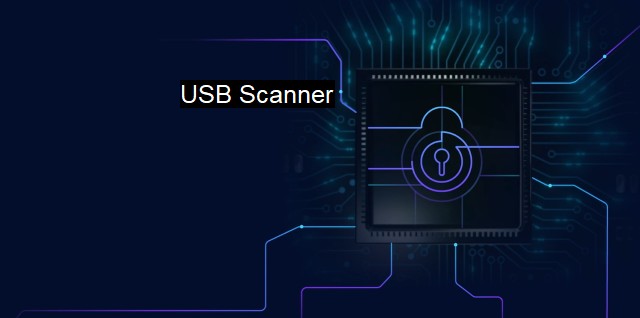What is USB Scanner?
Examining the Role of USB Scanners in Digital Documentation: Operation, Vulnerability, and Cybersecurity Measures
The "USB Scanner" in the context of cybersecurity and antivirus refers to software or tools designed to scan USB devices such as pen drives, flash drives, external hard disks, and other removable media devices for vulnerabilities, threats, or any kind of malicious software commonly known as malware.Malware is any software specifically designed to damage computers, servers, or networks. It includes viruses, ransomware, spyware, and trojans. One of the most common methods used by attackers to distribute malware is through USB devices. This is primarily because users frequently use these devices to transfer files between systems, providing a perfect transportation mode for malware.
A USB Scanner becomes a crucial tool under these circumstances. It scans the USB memory as soon as it is plugged into a device (a computer, laptop, or any other system compatible with USB devices). This enables the proactive detection of any malicious files that could be present to harm the host system. Some advanced USB scanners can remove malware upon detection, thereby keeping the device safe.
USB scanners are effective for preventing what is known as "Autorun Virus." When an infected USB device is plugged into a system, Autorun Virus gets activated and starts executing without user intervention on machines running Windows-based systems (pre-Windows 7 versions).
USB scanners keep an eye on these Autorun.inf files and meticulously identify any suspicious activities associated with these files. If the USB scanner identifies an Autorun.inf file filled with malicious codes, it immediately blocks the file, sending a notification to the user of the detection and attempts to clean up the malicious program from the USB device.
It is imperative that all devices connected to a computer network be clean and free from malicious threats. With versatile malware quickly spreading through multiple vectors, USB devices have become a hotbed for malware propagation. Flash drives are easy to carry, get lost, and may get in the hands of those with malicious intent, causing a security lapse.
USB scanner assists in sealing this breach. It specializes in identifying different types of viruses, including new ones that might not be in the antivirus software's database. These sophisticated USB scanners employ heuristic scanning processes that can detect previously unrecognized malware based on previous viruses and malware files' behavioral patterns.
Specific USB scanners come equipped with features like intrusion detection systems (IDS) and intrusion prevention systems (IPS) that protect against broader threats by monitoring the system and stopping executions that seem suspicious.
Consequently, USB scanners are crucial for organizations aiming for robust cybersecurity, both from insider and external threats; they offer added protection at the end-points of a network.
USB scanners not only proactively detect and eliminate malware but also preserve the integrity of data stored on flash drives and ensure uninterrupted business operations. This aspect is essential during a time when data forms the backbone of decision-making processes in organizations.
USB scanners should complement a comprehensive cybersecurity approach that involves an up-to-date antivirus system, a firewall, using strong and unique default credentials, frequently updating the software, among other things. Such a multi-layered security approach provides efficient detection and response to threats, reducing the risk factors associated with cyber attacks.
USB scanners have become increasingly necessary for cybersecurity. With ever-evolving cyber threats and the persistent usage of USB devices, USB scanning tools impose security measures that secure systems and networks from harmful attacks. They offer an effective safety measure for both individuals and organizations, allowing for the seamless transfer of data without compromising on secure IT environments.

USB Scanner FAQs
What is a USB scanner?
A USB scanner is a device that can be connected to a computer's USB port to scan documents, photos or other physical items and convert them into digital files.Can a USB scanner pose a security risk to my computer?
Yes, a USB scanner can potentially pose a security risk to your computer if it is infected with malware, virus or any other malicious software.How can I ensure that a USB scanner is safe to use in terms of cybersecurity?
To ensure that a USB scanner is safe to use, you should only buy it from a reputable manufacturer and download the drivers from the official website. You should also keep your antivirus software updated and run regular scans on your computer.What are some of the best antivirus programs that can protect my computer from potential risks associated with USB scanners?
Some of the best antivirus programs that can protect your computer from potential risks associated with USB scanners include Norton, McAfee, Avast, Kaspersky, and Bitdefender.| | A | | | B | | | C | | | D | | | E | | | F | | | G | | | H | | | I | | | J | | | K | | | L | | | M | |
| | N | | | O | | | P | | | Q | | | R | | | S | | | T | | | U | | | V | | | W | | | X | | | Y | | | Z | |
| | 1 | | | 2 | | | 3 | | | 4 | | | 7 | | | 8 | | |||||||